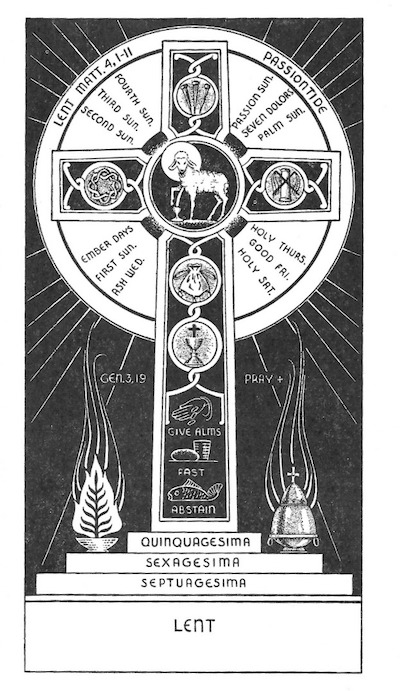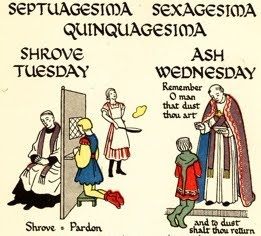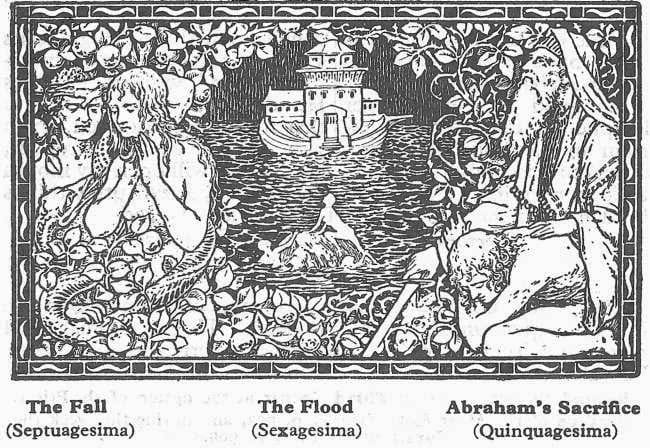EDITORS NOTE: If you would like to take part in an upcoming webinar on how to have a transformational lent, CLICK HERE – Otherwise enjoy this extremely helpful reflection. – Dan Burke
Dom Prosper Guéranger, O.S.B., abbot of Solesmes from 1837-1875, devoted a whole volume of his great work – The Liturgical Year to  Septuagesima. In his Preface, Dom Guéranger referred to Septuagesima as a season of “transition, inasmuch as it includes the period between two important Seasons, – Christmas and Lent.” Reading the image here at the base of the cross, moving up toward the cross, we see the first step is SEPTUAGESIMA, the second SEXAGESIMA, the third is QUINQUAGESIMA. They make up the three Sundays of the Septuagesima season, which leads us up to ASH WED. (on the left of the circle that signifies LENT). The meaning of the Latin names for the Sundays of the Septuagesima season are explained below.
Septuagesima. In his Preface, Dom Guéranger referred to Septuagesima as a season of “transition, inasmuch as it includes the period between two important Seasons, – Christmas and Lent.” Reading the image here at the base of the cross, moving up toward the cross, we see the first step is SEPTUAGESIMA, the second SEXAGESIMA, the third is QUINQUAGESIMA. They make up the three Sundays of the Septuagesima season, which leads us up to ASH WED. (on the left of the circle that signifies LENT). The meaning of the Latin names for the Sundays of the Septuagesima season are explained below.
In the Gospel of Septuagesima Sunday (Tridentine calendar), the master invites workers into his vineyard, and he pays the ones who came last the same as the ones who worked all day in the heat of the sun. “The last shall be first, the first shall be last.”
In the chapter titled “The History of Septuagesima,” Dom Guéranger added, “The Church, therefore, has instituted a preparation for the holy time of Lent. She gives us the three weeks of Septuagesima, during which she withdraws us, as much as may be, from the noisy distractions of the world, in order that our hearts may be the more readily impressed by the solemn warning she is to give us, at the commencement of Lent, by marking our foreheads with ashes.”
Septuagesima Sunday is the ninth Sunday before Lent, and it is the day that begins the Septuagesima season, which is made up of three Sundays: Septuagesima (which means seventieth), Sexagesima (which means sixtieth), and Quinquagesima (which means fiftieth), and then it extends until Ash Wednesday.
Quadragesima is the name given in most languages to the season of Lent that starts on Ash Wednesday. For a few examples, in Spanish the name is cuaresma, in Portuguese quaresma, in French carême, and in Italian quaresima. In English, in contrast, the word for spring, “lent,” was used, which derives from the German word for long, because at this time of year the days get longer.
Also in “The History of Septuagesima,” Dom Guéranger explained that the names of the Sundays in Septuagesima are in reference to Quadragesima, “The first Sunday of Lent being called Quadragesima (Forty), each of the three previous Sundays has a name expressive of an additional ten: the nearest to Lent being called Quinquagesima (Fifty); the middle one, Sexagesima (Sixty); the third, Septuagesima (Seventy). He wrote: “The words Quinquagesima, Sexagesima, and Septuagesima, tell us of the same great Solemnity as looming in the distance, and as being the great object towards which the Church would have us now begin to turn all our thoughts, and desires, and devotion.”
 So it is obvious that in this season as in all aspects of the Catholic faith, numbers are always highly weighted with symbolism but they often are not used literally. For more examples, although Quinquagesima means fiftieth, it is actually forty-nine days before Easter. It is fifty days before Easter only if you include the day of Easter itself. (Similarly, Pentecost is supposed to be fifty days after Easter, but that is true only if you count Easter and Pentecost in the numbers of days.) The numbering of the Sundays in Septuagesima get more approximate the further back each Sunday is from Quinquagesima. Sexagesima, which means sixtieth, is actually fifty-six days before Easter, and Septuagesima (seventieth) is actually sixty-three days.
So it is obvious that in this season as in all aspects of the Catholic faith, numbers are always highly weighted with symbolism but they often are not used literally. For more examples, although Quinquagesima means fiftieth, it is actually forty-nine days before Easter. It is fifty days before Easter only if you include the day of Easter itself. (Similarly, Pentecost is supposed to be fifty days after Easter, but that is true only if you count Easter and Pentecost in the numbers of days.) The numbering of the Sundays in Septuagesima get more approximate the further back each Sunday is from Quinquagesima. Sexagesima, which means sixtieth, is actually fifty-six days before Easter, and Septuagesima (seventieth) is actually sixty-three days.
And as Dom Guéranger explained, the mysteries of this Septuagesima “season of holy mourning” are based on the number seven, which is one of the most significant of all the numbers associated with the doctrine of the Catholic faith. In one way, the season of Septuagesima can also be seen as embracing the whole time between the Sunday of Septuagesima and Easter. “The season upon which we are now entering is expressive of several profound mysteries. But these mysteries belong not only to the three weeks which are preparatory to Lent: they continue throughout the whole period of time which separates us from the great feast of Easter. … The people of Israel, whose whole history is but one great type of the human race, was banished from Jerusalem and kept in bondage in Babylon. Now, this captivity, which kept the Israelites exiles from Sion, lasted seventy years; and it is to express this mystery, as Alcuin, Amalarius, Ivo of Chartres, and all the great liturgists tell us, that the Church fixed the number of seventy for the days of expiation. It is true, there are but sixty-three days between Septuagesima and Easter; but the Church, according to the style so continually used in the sacred Scriptures, uses the round number instead of the literal and precise one.”
HOW THE CHURCH KEEPS SEPTUAGESIMA
Beginning with Compline (Night Prayer) on the Saturday before Septuagesima Sunday the Alleluia, Gloria, and Te Deum are not said any more until Easter. Two extra Alleluias are said at Vespers on that Saturday. Throughout Septuagesima, violet vestments are worn, except on feasts observed during weekdays.
Following is Dom Guéranger’s thorough and lyrical way of explaining these differences during this penitential season from his chapter “The Mystery of Septuagesima.”
“The leading feature, then, of Septuagesima is the total suspension of the Alleluia, which is not to be again heard upon the earth, until the arrival of that happy day, when, having suffered death with our Jesus, and having been buried together with him, we shall rise again with him to a new life [Coloss. ii. 12].
“The sweet Hymn of the Angels, Gloria in Excelsis Deo, which we have sung every Sunday since the Birth of our Saviour in Bethlehem, is also taken from us; it is only on the Feasts of the Saints, which may be kept during the week, that we shall be allowed to repeat it. The night Office of the Sunday is to lose, also, from now till Easter, its magnificent Ambrosian Hymn, the Te Deum . . ..
“After the Gradual of the Mass, instead of the thrice-repeated Alleluia, which prepared our hearts to listen to the voice of God in the Holy Gospel, we shall hear but a mournful and protracted chant, called, on that account, the Tract.
“That the eye, too, may teach us, that the Season we are entering on, is one of mourning, the Church will vest her Ministers, (both on Sundays and the days during the week, which are not Feasts of Saints,) in the somber Purple.”
The prayers and readings in the Mass and in the Divine Office take up the season’s refrain of holy mourning too, as part of preparing our minds and hearts for the remembrance of Lent and of the Passion to come.
“Circumdederunt Me” is the incipit (the beginning) of the Introit for Septuagesima Sunday and is a fitting introduction to this season of holy mourning.
“The sorrows of death surrounded me, the sorrows of hell encompassed me; and in my affliction I called upon the Lord, and He heard my voice from His holy temple. — (Ps.17. 2, 3). I will love Thee, O Lord, my strength: the Lord is my firmament, my refuge, and my deliverer. “
HOW ARE WE TO KEEP SEPTUAGESIMA?
On the day before Septuagesima Sunday, various ceremonies are practiced in some Catholic churches and homes, to say “goodbye to the Alleluia.” One homeschooling mother blogged about having her children use finger puppets to sing goodbye to the Alleluia. In some churches, charming ceremonies are practiced in which a symbolic piece of paper with Alleluia written on it is put into a little coffin and buried, to be resurrected again on Easter Sunday.
Dom Guéranger also tells us how we are supposed to keep Septuagesima:
- By entering into the spirit of the Church in sober, mournful, preparation for the penitence of Lent
- By growing in holy fear of God
- By considering what original sin and our own sins have done to deserve God’s judgments
- By rising up from indifference
- By realizing our need for the saving sacrifice of Christ that we will remember in great detail during Lent
“After having spent the three weeks of Septuagesima in meditating upon our spiritual infirmities, and upon the wounds caused in us by sin, —we should be ready to enter upon the penitential season, which the Church has now begun. We have now a clearer knowledge of the justice and holiness of God, and of the dangers that await an impenitent soul; and, that our repentance might be earnest and lasting, we have bade farewell to the vain joys and baubles of the world. Our pride has been humbled by the prophecy, that these bodies would soon be like the ashes that wrote the memento of death upon our foreheads.” – Dom Guéranger in “The Practice of Lent” in The Liturgical Year.
This content is provided courtesy of the Institute of Christ the King and has been edited.




